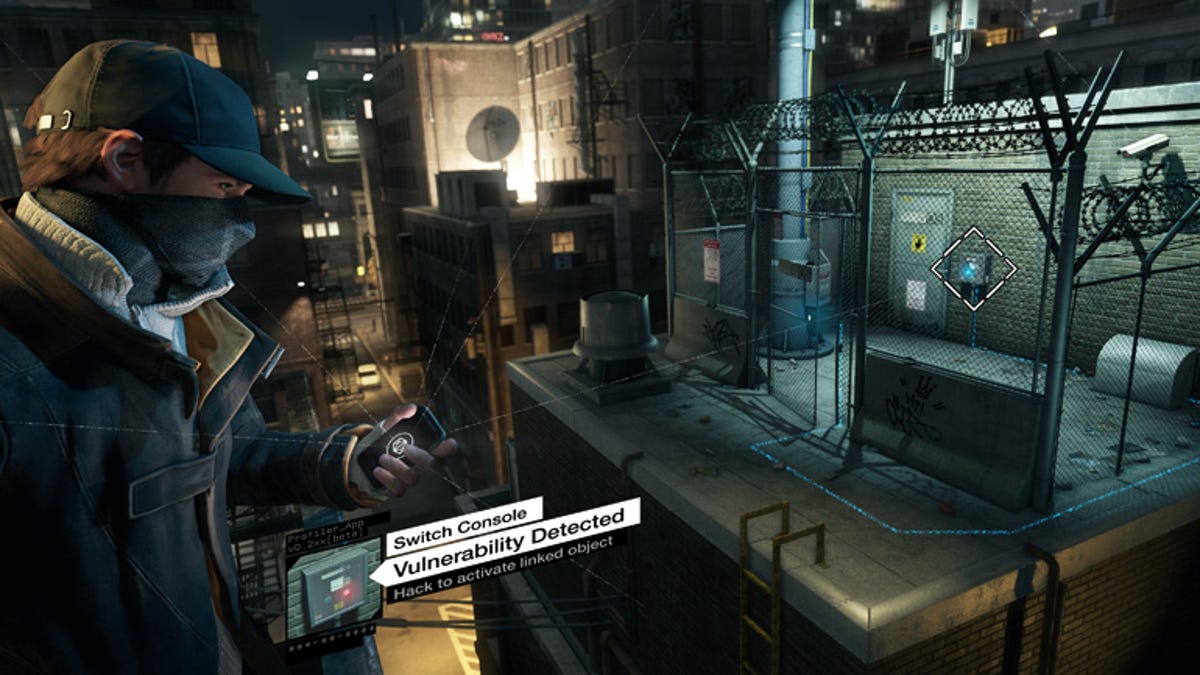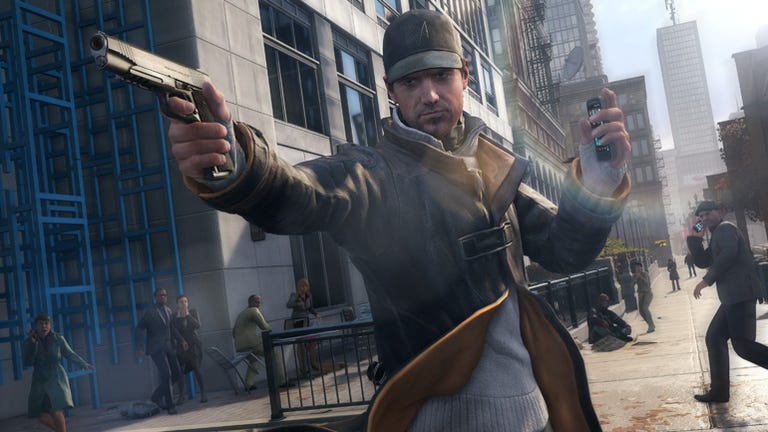 Why You Can Trust CNET
Why You Can Trust CNET Watch Dogs (PS4, Xbox One, PC, PS3, Xbox 360) review: Ubisoft's open-world hacking game struggles to establish a connection
Watch Dogs manages to impress at times, but its overly ambitious promise is never fully realized. There's a lot of fluff baked into the experience that might leave some disappointed and wanting more.
It's really not fair for a game to get the kind of hype that Watch Dogs has received over the last two years. Its publisher, Ubisoft, would never admit it, but the initial reception the game got back at E3 2012 was ridiculous. It immediately set unrealistic expectations for something that was so far away from being released, with so few people actually getting their hands on trying it.
The Good
The Bad
The Bottom Line
It was one of those lightning in a bottle moments. There was an instant buzz reverberating through the show floor in Los Angeles -- and no one had a firm grasp on what the the game was really about. Interestingly enough, for a title that was able to generate such an organic groundswell for what appeared to be a fresh idea, Watch Dogs lifts influence from countless facets of modern culture, well beyond the obvious hat tip to Grand Theft Auto.
So how on Earth could anything live up to the emotional and monetary investment so many gamers have already pledged? I'm not entirely sure. Because while Watch Dogs has its moments of nirvana, there's some stuff that falls flat, and whole bunch of mediocrity jammed in the middle. In the end, the experience as a whole isn't regrettable, it's just more contrived than you might be willing to accept.

I think Watch Dogs' debut made such an insurmountable splash because people's imaginations ran wild with suggestions of what might be possible in the game. Those expectations can doom a title out of the gate. Watch Dogs doesn't feel as "open-world" as a game like Grand Theft Auto V, mostly because it fails to blur the boundaries of what's possible in the game. Once I was able to wrap my head around the rule set of the Watch Dogs world, everything suddenly felt small and unimportant.
Hacking, the very mechanic Watch Dogs is built upon, doesn't feel strong enough to carry an entire game.
You play as Aiden Pearce, an antihero who has inexplicable hacking abilities that he shares with an underground network of quasi-acquaintances. A few months back his nefarious actions cost him the loss of a loved one. Since that night, guilt has been eating away at him and it's chewed through his relationship with his family. Now it's time for Pearce to get to the bottom of a corrupt world of surveillance and control in order to make sense of who is responsible for his pain.
The game takes place in an alternate present-day Chicago where the entire city is accessible through an all-seeing, interconnected network known as CenTral Operating System, or ctOS. It's the intravenous lifeline of the city, with its tentacles dipped in every aspect of everyday urban life.
Pearce can jack into all of these utilities through his smartphone. He can piggyback into security cameras, trigger traffic lights to switch, cause drawbridges to rise, control trains, and more.
In close-quarters situations Pearce can force electrical boxes to explode, steam pipes to burst, activate forklifts, open gates and unlock doors. These assets form an diabolical sense of playing boobytrap puppetmaster, especially when you're conducting the chaos hidden behind a corner.
Aiden can enter a "profiling mode" at any time that sniffs out top-level information about anyone in the city. It's a neat trick, but it only allows you to steal their bank account balance, unlock a type of car, or eavesdrop on a random call or text. Occasionally they'll lead to a side-mission, but it's overlap that you can access other ways, sometimes contextually within a campaign mission.
Not every area is immediately available to Aiden's smartphone. A district's ctOS mainframe must first be exploited before he has unrestricted access. Think of these as the "viewpoint" locations from the Assassin's Creed series.
The lifeline of the game is centered around security cameras though, as they allow you to chain hacks together as you sort of "Spider-man" from viewpoint to viewpoint. Anything you can see through the lens of a camera is vulnerable.
Players are presented with an deceptively overwhelming amount to do from the start. You can dive right into the campaign to chase down the narrative of Aiden's shattered past and present, or you can spend some time looking for hidden items, compete in races or intercept convoys, among other objectives.
The campaign takes a few hours to gain some momentum, but it's not without the constant bombardment of HUD items distracting you from the game's other features. Some of the extra items are fun to investigate, but others aren't worth more than a first try. There's also a handful of activities that you're bound to have seen before. Can anyone really stomach another round of Texas Hold 'em? A lot of the extras in the game aren't worth the time spent completing them. After a while, earning more cash turns stale and collecting XP feels fruitless. Beyond completionists, most players will get tired of them quickly.
Watch Dogs doesn't do a great job of explaining the circumstances that I, playing as Aiden Pearce, found myself in. At first I thought I'd be maneuvering through the game mostly as a stealthy hacker, secretly infiltrating highly classified areas -- you know, controlling the show from behind the curtain. I was able to piece together that I've assumed the role of a vigilante of some sort, but overall I found my role conflicting. Eventually I was told I need to buy a gun, and all of a sudden I realized, "I need to start killing these people."
Check out all of GameSpot's coverage of Watch Dogs
Fortunately, you don't always need to go out guns blazing. Pearce can craft hacking tools using parts found in the world. He can jam enemy communications which stall ctOS getting a lock on his location, or he can create a decoy that will distract guards. My personal favorite, the blackout, kills all power in an area so Pearce can make a ninja-esque escape.
Players will need to keep the reputation system in mind during play too. Killing or injuring citizens will make you more notorious and susceptible to drawing attention, while punishing criminals and doing good creates a more positive perception with the public.
The game's design encourages the player to pick their own path, especially when penetrating a ctOS stronghold. The game does a commendable job of combining stealth and action, offering a satisfying amount of variation should you choose to use it.
Pearce quickly unlocks a set of skills within the first couple of hours of gameplay, but then fails to really seem more powerful from there on. Earning these perks started to feel cheap after a while. Almost everything significant is available at the start or shortly thereafter.
Early on you'll unlock the "focus" perk, a temporary moment of slo-mo that gives you a reactionary advantage to shoot or use environmental hacks to sabotage your enemies. It's undoubtedly fun to use, especially when you catch a bad guy at the right time. Watching a lethargic ragdoll get zapped by a conduit or blown up by a generator never really gets old. When driving, focus gives you a split-second advantage to switch a traffic light or raise a roadblock, taking down a trailing car a la "Burnout 3" style.
But while there are these moments of jubilation, Watch Dogs feels disjointed at times, causing the player to crash down to reality from climactic heights.
For these types of games to work on multiple levels, all cylinders need to be firing at the same time, each holding up their end of the workload. For some of the game, Watch Dogs feels unbalanced. The storyline is familiar and regrettably doesn't rev up to the point where you feel compelled to see it through. Save for a few standouts, most of the cast is forgettable.
I also felt that the representation of Chicago crafted by Ubisoft Montreal, while detailed and rich, lacked personality. There's a sense of isolation I had with the city -- a feeling that I was detached from its world. Playing an intrusion side quest sheds a bit of light on the day-to-day life of its inhabitants, but it's only a one-sided affair.
Where Watch Dogs really starts to move the needle in terms of innovation is in its complex online features. If your console is connected to the Internet, you're "vulnerable" to being hacked. Behind the scenes, another player can initiate a number of minigames, most of which you'll have the option to decline. But every now and then, you'll be notified that another user is hacking you, and you'll be given a few minutes to uncover their surrounding location.
This forced-immersion mechanic is pretty cool. There's a playful sense of personal violation I felt the first time it happened. The online branch of the game also opens up a robust set of competitive leaderboards in nearly every side quest. You can even create a custom challenge for others to participate in, letting you leave your own little mark on the world.
There's an interesting Foursquare-inspired system in the game too, where players can check in to 100 different locations in Chicago where you can leave or receive a gift from other random or friendly players.
When it comes to presentation, Watch Dogs really hits it out of the park. There's an awful amount of eye candy woven into Watch Dogs' packaging, from the ASCII art and buffering distortion effects to the cyberpunk-themed graffiti and street art peppered throughout the city.
Up until I began playing Watch Dogs, I was convinced that the game was trying to make insightful commentary on our need to always be connected, or our electric addiction and the forfeiting of privacy. That never really manifests in the campaign. You're bound to get drips and drabs of it through some of the canned narrative flowing within the city, but anything beyond "Big Brother is bad" and "Ignorance is bliss" is nowhere to be found.
Watch Dogs is already a success because it's managed to generate enough pre-orders most triple-A games would be more than satisfied with. The machine has done its job. But are we getting what we really wanted? Or even expected? It's an impossible metric to gauge. Watch Dogs introduces some unique gameplay at times, but at others it fails to supersede the successful properties it so directly references and challenges.
I'll be the first to admit it. I'm guilty of throwing around buzzworthy phrases like "next-gen begins with Watch Dogs." I bought into what it was selling. But what I've learned playing through the game is that no piece of software is going to define a generation of interactive entertainment. For better or worse, Watch Dogs is another rung in the ladder toward that impossible goal.
CNET verdict: Same dog with a few new tricks
Watch Dogs manages to impress at times, but its overly ambitious promise is never fully realized. There's a lot of fluff baked into the experience that might leave some disappointed and likely wanting more.
Check out all of GameSpot's coverage of Watch Dogs


